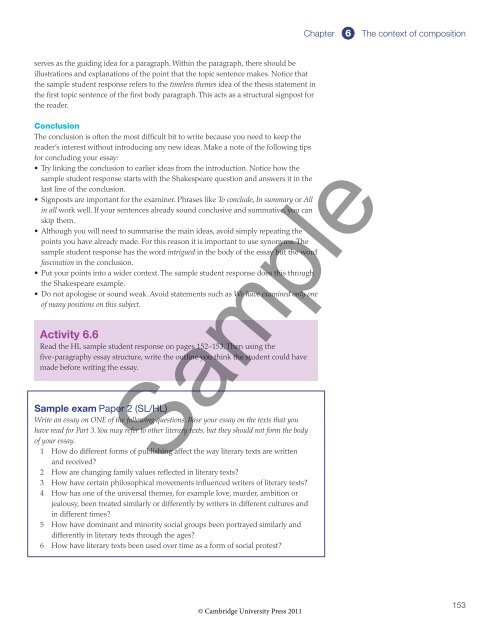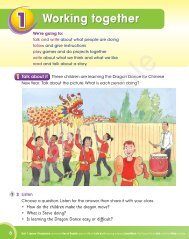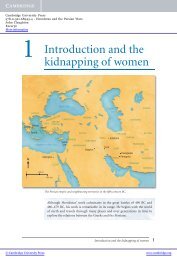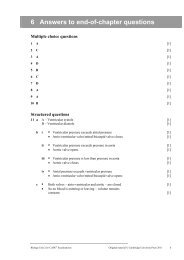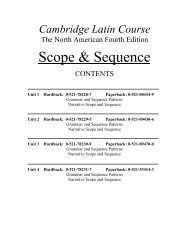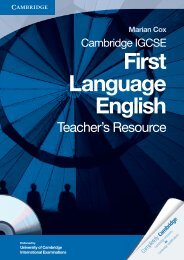Brad Philpot - Cambridge University Press
Brad Philpot - Cambridge University Press
Brad Philpot - Cambridge University Press
You also want an ePaper? Increase the reach of your titles
YUMPU automatically turns print PDFs into web optimized ePapers that Google loves.
serves as the guiding idea for a paragraph. Within the paragraph, there should be<br />
illustrations and explanations of the point that the topic sentence makes. Notice that<br />
the sample student response refers to the timeless themes idea of the thesis statement in<br />
the first topic sentence of the first body paragraph. This acts as a structural signpost for<br />
the reader.<br />
Conclusion<br />
The conclusion is often the most difficult bit to write because you need to keep the<br />
reader’s interest without introducing any new ideas. Make a note of the following tips<br />
for concluding your essay:<br />
Try linking the conclusion to earlier ideas from the introduction. Notice how the<br />
sample student response starts with the Shakespeare question and answers it in the<br />
last line of the conclusion.<br />
Signposts are important for the examiner. Phrases like To conclude, In summary or All<br />
in all work well. If your sentences already sound conclusive and summative, you can<br />
skip them.<br />
Although you will need to summarise the main ideas, avoid simply repeating the<br />
points you have already made. For this reason it is important to use synonyms. The<br />
sample student response has the word intrigued in the body of the essay but the word<br />
fascination in the conclusion.<br />
Put your points into a wider context. The sample student response does this through<br />
the Shakespeare example.<br />
Do not apologise or sound weak. Avoid statements such as We have examined only one<br />
of many positions on this subject.<br />
Activity 6.6<br />
Read the HL sample student response on pages 152–153. Then using the<br />
five-paragraphy essay structure, write the outline you think the student could have<br />
made before writing the essay.<br />
Sample exam Paper 2 (SL/HL)<br />
Write an essay on ONE of the following questions. Base your essay on the texts that you<br />
have read for Part 3. You may refer to other literary texts, but they should not form the body<br />
of your essay.<br />
1 How do different forms of publishing affect the way literary texts are written<br />
and received?<br />
2 How are changing family values refl ected in literary texts?<br />
3 How have certain philosophical movements infl uenced writers of literary texts?<br />
4 How has one of the universal themes, for example love, murder, ambition or<br />
jealousy, been treated similarly or differently by writers in different cultures and<br />
in different times?<br />
5 How have dominant and minority social groups been portrayed similarly and<br />
differently in literary texts through the ages?<br />
6 How have literary texts been used over time as a form of social protest?<br />
Chapter 6 The context of composition<br />
Sample<br />
© <strong>Cambridge</strong> <strong>University</strong> <strong>Press</strong> 2011<br />
153


